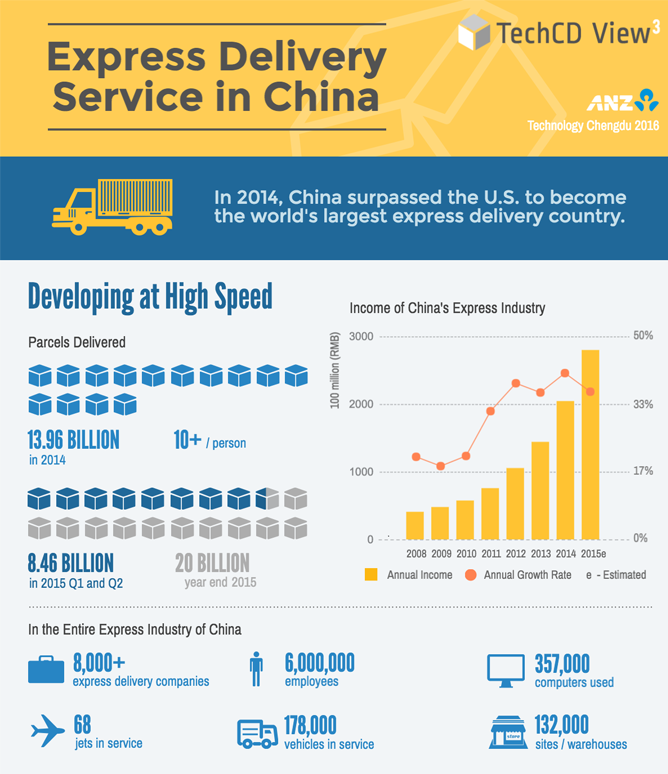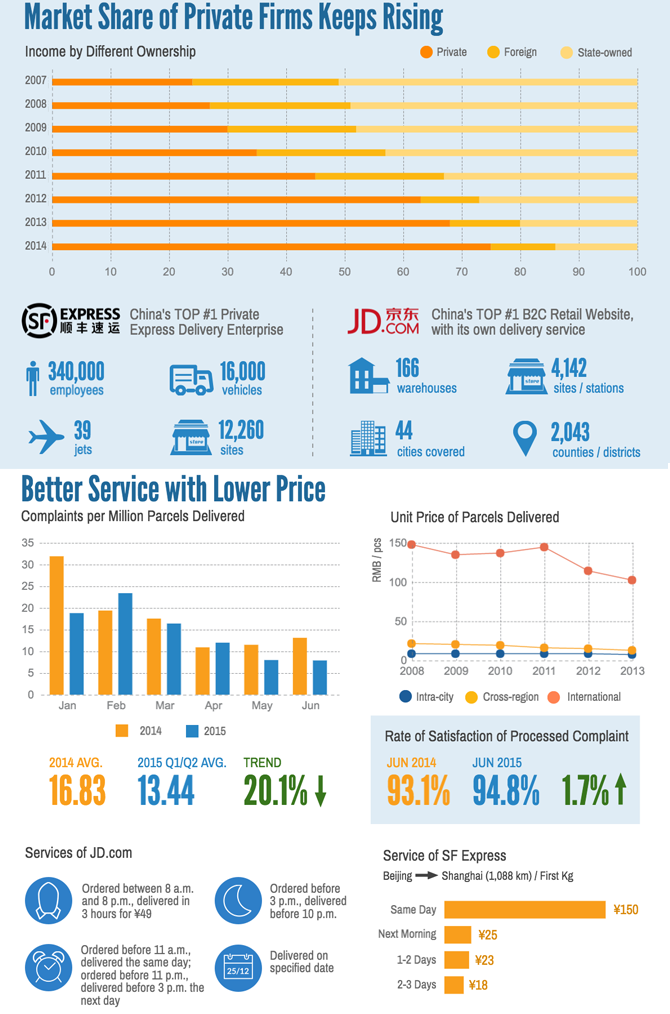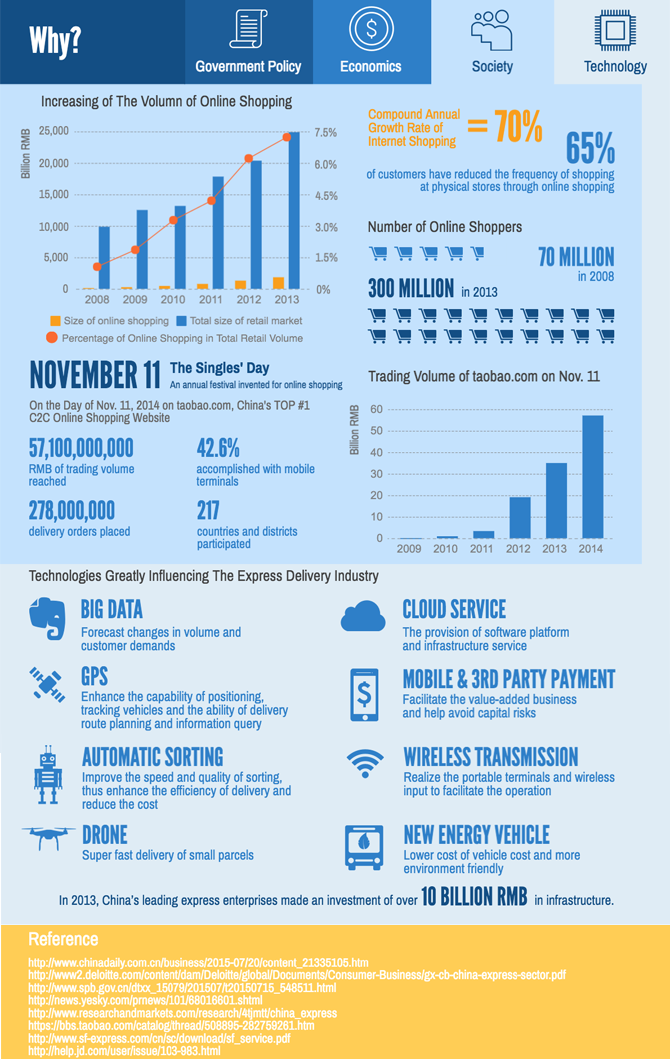Special delivery: China’s logistics boom
More AddThis Share optionsShare to LinkedInShare to TwitterShare to FacebookShare to Google+Share to EmailShare to Print
Similar to many of my peers – if I haven’t been dragged to the shopping malls - I buy almost everything online. Thanks to China’s rapid development in the internet age, this is now really a breeze.
It’s well known China’s technology giants such as Alibaba and Tencent have helped foster the country’s surging e-commerce industry by providing consumers a digital way to shop and pay, as well as merchants a convenient way to sell and get paid.
What is less well-known is how China’s logistics industry, especially in the express delivery service sector, has flourished and advanced in the past 10 years, completing the last mile of service and delivering the ultimate customer experience.
 A friend of mine who launched an online bookstore in China in the mid-nineties failed miserably, with no thanks to immature technology, unclear regulations, and many other factors. However the major issue was a logistic one – the country had far fewer highways and cars at the time.
A friend of mine who launched an online bookstore in China in the mid-nineties failed miserably, with no thanks to immature technology, unclear regulations, and many other factors. However the major issue was a logistic one – the country had far fewer highways and cars at the time.
Fast forward two decades and China has freeways connecting even the most rural areas. High -speed railway networks link major cities, new airports have been built since turn of the century and there has been a rapid rise of vehicles on the roads.
Express-delivery service is big business in China today. In 2014, the total operating income generated by the mainland’s express enterprises reached RMB 200 billion with a year-on-year growth rate of 36.6 per cent. Close to 14 billion parcels were delivered, which leads the rest of the world.
 One of the top express service companies, SF Express was founded by Dick Wang more than 20 years ago. The company now operates with 34 jets, 160 trucks, and 340,000 employees, with annual revenue of RMB 15 billion ($US2.3 Billion) (2011).
One of the top express service companies, SF Express was founded by Dick Wang more than 20 years ago. The company now operates with 34 jets, 160 trucks, and 340,000 employees, with annual revenue of RMB 15 billion ($US2.3 Billion) (2011).
SF has invested heavily into their delivery service platform with technology and satellite communication ensuring uninterrupted services, from online payment, parcel collection, classification, repackaging, transportation, sorting, customer delivery, to after sales call centre service.
The company is also the first mainland express service firm to hire a senior technology executive from the banking industry as chief information officer.

The policy, coined “Internet+”, intends to promote the integration of traditional industry with technology (mobile internet, big data, internet of things and the like), which applies to the manufacturing, financial, government, agricultural and medical sectors.
This also coincides with the continuing effort of modernisation within the logistic industry, where technology plays a pivotal role for express service companies in meeting the rapid rise in demand from consumers.
Some leading organisations have already utilised technology to expand their service offerings to customers, including intelligent storage for delivery and pickup, mobile payment facilities for swift cashless settlement and drone delivery (trial stage) for unmanned transportations of goods.
In parallel, the government has relaxed its regulations allowing foreign players to expand their footprint in China, which intensifies competition.
Regardless of China’s recent economic slowdown, the country’s rapidly expanding middle class and evolving consumer behaviour will continue to drive the online shopping demand, which requires extensive logistic support from the express delivery industry.
This sector will further accelerate its reform within the next few years, with market consolidation, technological advancement and foreign competition transforming this traditionally labour-intensive and relatively low-end segment into a modern customer service-oriented industry, integrating with China’s evolving e-commerce eco system, already one of the world’s finest.
Greg Au-Yeung is Head of Technology China at ANZ
It’s well known China’s technology giants such as Alibaba and Tencent have helped foster the country’s surging e-commerce industry by providing consumers a digital way to shop and pay, as well as merchants a convenient way to sell and get paid.
What is less well-known is how China’s logistics industry, especially in the express delivery service sector, has flourished and advanced in the past 10 years, completing the last mile of service and delivering the ultimate customer experience.

Fast forward two decades and China has freeways connecting even the most rural areas. High -speed railway networks link major cities, new airports have been built since turn of the century and there has been a rapid rise of vehicles on the roads.
Express-delivery service is big business in China today. In 2014, the total operating income generated by the mainland’s express enterprises reached RMB 200 billion with a year-on-year growth rate of 36.6 per cent. Close to 14 billion parcels were delivered, which leads the rest of the world.

SF has invested heavily into their delivery service platform with technology and satellite communication ensuring uninterrupted services, from online payment, parcel collection, classification, repackaging, transportation, sorting, customer delivery, to after sales call centre service.
The company is also the first mainland express service firm to hire a senior technology executive from the banking industry as chief information officer.

Internet+
The Chinese government’s has a strategy to create a new driving force to stimulate economic development, with the aid of technology.The policy, coined “Internet+”, intends to promote the integration of traditional industry with technology (mobile internet, big data, internet of things and the like), which applies to the manufacturing, financial, government, agricultural and medical sectors.
This also coincides with the continuing effort of modernisation within the logistic industry, where technology plays a pivotal role for express service companies in meeting the rapid rise in demand from consumers.
Some leading organisations have already utilised technology to expand their service offerings to customers, including intelligent storage for delivery and pickup, mobile payment facilities for swift cashless settlement and drone delivery (trial stage) for unmanned transportations of goods.
Sign up for our free weekly newsletter
Subscribe
This prospective commercial sector has also attracted other big players. Alibaba, JD (China’s leading B2C online store), and Suning (China’s leading home appliance retail chain) have established their own express delivery franchise in the past few years to enter this lucrative market.Subscribe
In parallel, the government has relaxed its regulations allowing foreign players to expand their footprint in China, which intensifies competition.
Regardless of China’s recent economic slowdown, the country’s rapidly expanding middle class and evolving consumer behaviour will continue to drive the online shopping demand, which requires extensive logistic support from the express delivery industry.
More ahead
Considering China’s development, sheer size of population and territory, plus the explosive growth in e-commerce, it’s not hard to figure out the potential for express delivery service.This sector will further accelerate its reform within the next few years, with market consolidation, technological advancement and foreign competition transforming this traditionally labour-intensive and relatively low-end segment into a modern customer service-oriented industry, integrating with China’s evolving e-commerce eco system, already one of the world’s finest.
Greg Au-Yeung is Head of Technology China at ANZ

No comments:
Post a Comment